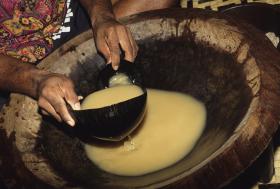Kava
awa, grog, kava kava, kawa, lewena, sakau, waka, wati, yaqona

The information on this page has been sourced from NSW Health.
Kava is a depressant drug, which means it slows down the messages travelling between the brain and the body. Kava is the common word for the pepper plant piper methysticum.
The active compounds in kava are called kavalactones.
Drinking kava is a traditional practice for many Pacific and South Sea Island communities, where it is used during cultural ceremonies, for medicinal purposes, and at social gatherings.
Kava and the law
Under the Australian New Zealand Food Standard Code, kava can be sold as a food if it is a beverage made by mixing kava and cold water only, or in the form of dried or raw kava root.
Therapeutic products which contain low doses of kava are available in Australia. These products are licensed through the Therapeutic Goods Administration and are used for anxiety, stress, and insomnia. How kava is used
Kava may come in the form of the root of a plant, a brown liquid or powder, or may be added to capsules, drops or drinks.
Short-term effects
Short-term effects may include:
- Relaxed feeling
- Being talkative
- Numbness of the mouth
- Tiredness
- Muscle weakness
- Reduced coordination
- Fatigue
The effects of kava depend on how much you ingest, how quickly you ingest it, whether you have eaten, your size and weight, your overall health and how often you use it.
It can also depend on how healthy your liver is. Or whether you use kava with alcohol or other drugs, including prescription medications.
Long-term effects
Long-term effects may include:
- Liver problems
- Weight loss and nutrition problems
- Nausea
- Stomach upset
- Red eyes
- Impotence in males
- Poor overall health
- Fatigue
- Low motivation
Using kava with other drugs
Ingesting kava at the same time as alcohol may make you feel more drunk than expected and may cause liver damage.
Ingesting kava at the same time as other drugs (including prescription medications) may increase the levels of those drugs in the body, slow down the removal process and increase the effects. Although the extent to which this occurs is not certain, it may be dangerous.
Kava and driving
Kava use (depending on the amount consumed) may affect your perception, alertness, and responsiveness and therefore your ability to drive safely. Some studies have shown the use of kava slows speech and movement. Data from some countries suggests that using kava before driving is associated with an increased risk of motor vehicle accidents.
Consumption of kava before driving a motor vehicle or operating machinery is not recommended. If feeling affected by kava avoid driving or using machinery.
Kava and pregnancy
There is limited evidence on the safety of kava use during pregnancy and breastfeeding.
The safest option for women who are trying to get pregnant, who are pregnant or who are breastfeeding is to not use kava.
Dependence
Evidence suggests that kava is not addictive. However, harmful use of kava, including ongoing, high-level consumption, has been known to occur in certain contexts.
Useful links
- Kava - NSW Health
- Kava: The Facts - NSW Health
- Kava - Alcohol and Drug Foundation
- Kava - Alcohol and Other Drugs Knowledge Centre
